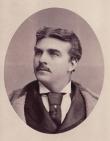The second son of William Rignall, a provincial theatre manager, and his actress wife Patience (née Blaxland), George Rignold, like his parents and older brother, William (1836–1904), used Rignold as a professional name. The brothers both began their careers as violinists in theatre orchestras, but after taking up a minor role at short notice in an 1857 production of Macbeth, George decided to pursue acting rather than music (William also later turned to acting and went on to establish a considerable reputation in Britain and Australia). After spending much of the 1860s working in the provinces, notably Bristol and Bath, George eventually moved to London, where in 1870 he began appearing in lead roles in London.
In 1875 Rignold accepted an offer from American managers A. M. Palmer and Jarrett to play Henry V at the Booth Theatre, New York. He later toured the US and Canada before sailing to Australia. His debut season playing Henry V (28 August) was an enormous success as was his subsequent tour of the county. Rignold returned to America and Great Britain, and at one stage became sub-lessee of London's Drury Lane Theatre. In November 1879, however, he staged an opulent version of Henry V. Although it reportedly excited audiences the production was panned by the critics, and the season became a financial failure.
Between 1880 and 1887 Rignold alternated tours of the Australasian region with ones to America. By 1884, however, he and his wife, actress Marie Henderson, had effectively settled in Sydney. In 1887 he went in to partnership with James Allison at the Sydney's newly built Her Majesty's Theatre (Pitt Str). After opening there on 10 September with Henry V he remained at the helm of the theatre until 1895.
The 1880s and early 1890s saw Rignold become involved in various facets of the theatre industry. "He wrote a flattering retrospective diary, brought out his own acting editions of Shakespeare and made lengthy speeches to his audiences; and while living at Paddington he bought a property at Middle Harbour, called Braybrook, and flew Henry V's standard whenever there (Van Der Poorten, n. pag.). He also continued to act, starring in and producing such plays as Julius Caesar (as Mark Antony) and A Midsummer's Dream (Bottom) in 1889. 1890 saw him play the role of Macbeth and Ford (to the Falstaff of his brother William) in The Merry Wives of Windsor.
Commercial pressure also led to him producing melodramas such as Lights o' London, Youth (Merritt and Harris), and In the Ranks (Sims and Pettit). He played Mephistopheles in Goethe's Faust and the villain in Called Back. His. He toured these through Victoria, Queensland and South Australia from 1895, while also returning to Shakespeare as often as possible, and had much success producing Christmas pantomimes like The House that Jack Built (1894, with Bert Royle). In 1899 he also co-wrote the historical drama Dreyfus with Walter Bentley.
Following the death of his wife in 1902, Rignold withdrew to partial seclusion at Middle Harbour. He performed only occasionally, and made his last stage appearance in Melbourne in August 1907 for his old friend Bland Holt. In 1907 he married Georgina Harriet Don, daughter of George Coppin. As with his first marriage this one was also childless. Rignold died of empyema and cardiac angina on 16 December 1912 at Darlinghurst's Charlemont Private Hospital. He is buried in the Anglican section of Waverley cemetery. He left the residue of his estate, valued for probate at over £11,000, to the Royal General Theatrical Fund.
As an actor Rignold's main assets were his physical dominance, his heroic looks and his formidable stage presence. In her Australian Dictionary of Biography entry Helen Van De Poorten writes: 'Despite mismanagement and unhappy years wasted in cheap melodramas, Rignold succeeded largely in persuading his public that he was the great Shakespearian actor he had wished to be. The lavishness of his spectacles brought the pictorial approach to theatre in Australia as far as it could go.'
_________
Sources: Ailsa McPherson. 'Rignold, George.' Dictionary of Sydney. 2010 [sighted 4/3/2014]; Leah Mercer. "A Worthy Scaffold - George Rignold's rewriting and Staging of Henry V." Australasian Drama Studies October. (1993); and Helen Van Der Poorten. 'Rignall, George Richard (1839–1912).' Australian Dictionary of Biography 6 (1976) [sighted 4/3/2014]
 7283805585067905172.jpg
7283805585067905172.jpg

